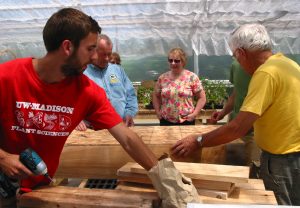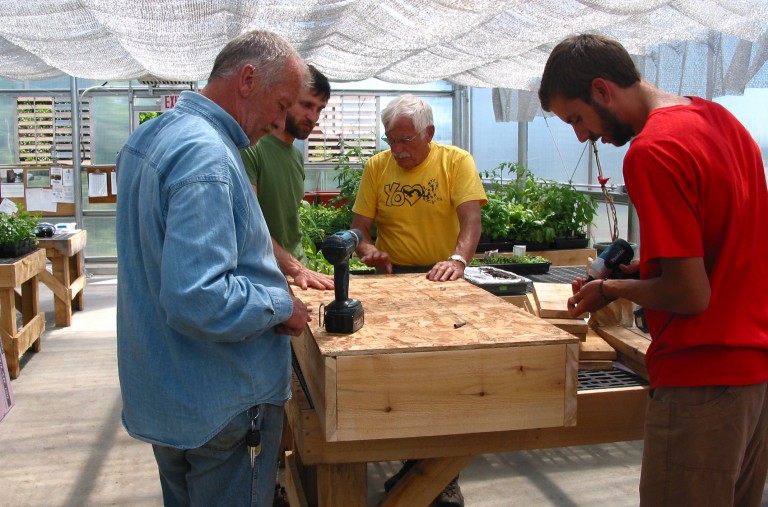Just as some seeds yield tomatoes, carrots and lettuce, others grow community and partnership.
In a greenhouse in the northern Wisconsin town of Park Falls, all of those seeds are taking root with the help of UW-Madison’s College of Agricultural and Life Sciences (CALS) horticulture graduate student Michael Geiger, horticulture professor Sara Patterson and a team of dedicated local leaders.
“The greenhouse has opened doors to making healthier food choices, to education about gardening in local schools—and it’s given the university a presence in Park Falls,” says Geiger, who grew up in Arbor Vitae, some 50 miles away.

Mike Geiger (left) at a hydroponic salad table workshop at the greenhouse. All photos courtesy of Mike Geiger.
Geiger’s involvement with the project – called the Flambeau River Community Growing Center – started as an idea in 2012. That’s when his friend Tracey Snyder, a nurse practitioner developing a wellness program at the nearby Flambeau River Papers mill in Park Falls, approached him seeking guidance on the greenhouse project.
“I was very interested in what she was saying and thought it was something that would be fun to work on,” says Geiger, who then was a senior horticulture student at UW-Madison.
Snyder’s group was seeking funding for a greenhouse project, and Geiger teamed with Patterson to identify possible revenue sources. They developed a proposal for the Ira and Ineva Reilly Baldwin Wisconsin Idea Endowment at UW–Madison.
Their proposal was funded in the summer of 2013, and by the fall construction had begun on a 25-by-50-foot vail-style greenhouse, built by community volunteers on a vacant lot donated by Flambeau River Papers just north of the mill.
The greenhouse, built to withstand the heavier snows of northern Wisconsin, features in-floor radiant heating and custom greenhouse growing tables made of locally purchased white cedar and built by volunteers. Plans call for the facility to eventually be heated with waste steam from the mill.
The Flambeau River Community Growing Center has gained popularity with community members and school groups interested in learning about plants and gardening. “It’s a greenhouse, but it’s also a classroom,” says Geiger.
Learners include children from the Chequamegon School District, who start seeds in the greenhouse and nurture seedlings until they can be transplanted to their own outdoor school gardens. Area 4–H groups grow plants and tend them in raised beds just outside the greenhouse. Master Gardener classes are held at the facility, and community workshops have included such topics as square-foot and container gardening as well as hydroponics. Kids have been delighted with sessions on soil testing and painting their own flowerpots.
“It’s clearly a benefit to build a connection between UW–Madison and the community, for the community itself—people from ages 3 to 90—and for the local schools,” Patterson says.
Community leaders and institutions have joined to fuel the center’s success. Its chief executive officer, Tony Thier, recently retired from Flambeau River Papers, says UW–Extension has provided valuable educational and technical support, and volunteer opportunities draw professionals from various companies in the area. Park Falls attorney Janet Marvin helped the center gain nonprofit status last fall.
Thier says the center provides needed education for area residents. “It’s been very beneficial,” he says. “When I got involved, it really became a passion. I wanted to learn more about gardening and increase my skill. We try to involve the whole community.”
Geiger says the project has helped him in his academic career as he learned about project planning, gave presentations about the center at two national academic conferences and writes scholarly articles about his work there.
“I’ve been able to see this process through from an idea to reality,” says Geiger. “It’s been really rewarding.”

